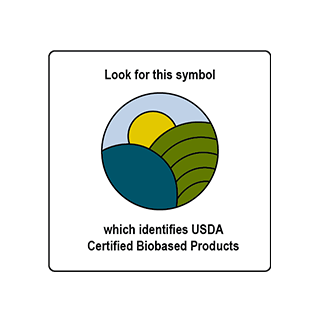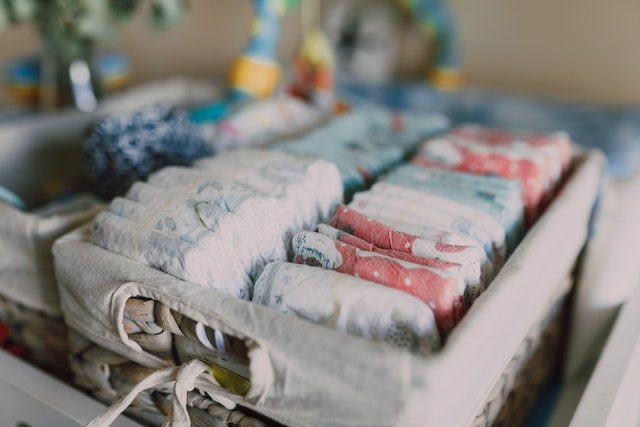Eyewear & More Baby Products in the USDA BioPreferred Program

As the USDA BioPreferred® Program celebrates its 20th anniversary this month, the Program increased the number of potential participants by adding 23 more product categories that qualify for a USDA Certified Biobased Product label. These product categories are not designated for federal purchasing preference at this time.
The BioPreferred Program was created by the 2002 Farm Bill and reauthorized and expanded as part of the Agriculture Improvement Act of 2018. To date, the Program has identified 139 categories of biobased products for which federal agencies and their contractors have purchasing requirements. There are more categories in the list but they are only eligible for the USDA Certified Biobased Product label. For a complete list of product categories for both voluntary labeling initiative and mandatory federal purchasing, visit the BioPreferred Program website.
Baby and Kids Products
The BioPreferred Program already had a general category for baby and kids products with a minimum biobased content requirement of 25%. Examples include toys, cleaners, clothing, bedding, baby wipes, diapers and child-safe sunscreen.

The Program recently expanded this category in response to the diversification of product options in this industry. The minimum biobased content requirements of these baby and kids products are now:
Baby Wipes – 80%
Bath Products – 57%
Diapers – 25%
Dishwashing Products – 64%
Durable Tableware and Cutlery – 92%
Laundry Products – 46%
Lotions, Moisturizers, and Oils – 84%
Oral Care Products – 93%
Sun Care Products – 57%
Surface and Toy Cleaners – 59%
Eyewear, Footwear and more
The BioPreferred Program also acknowledged products from emerging markets. To qualify for USDA Certified Biobased Product labeling, these products must have these biobased content levels at the minimum:
1. Cosmetic Tools and Applicators – 68%
Examples: Sponges, brushes, and other tools that are used to apply face products
2. Desk Accessories and Workspace Organizers – 75%
Examples: Pencil holders, paper clip dispensers, and desk organizers
Excluded from this category: Products that fit into other established categories such as paper products, trash bags, chair mats, etc.

3. Eyewear – 25%
Examples: Frames and lenses (either separately or together), contact lenses
4. Footwear – 25%
5. Oral Care Products
– Toothpaste and Mouthwash – 84%
– Oral Care Tools – 33%
Examples: Toothbrushes and toothbrush components, floss, floss picks, and tongue scrapers
6. Personal Accessories – 74%
Examples: Purses, bags, briefcases, wallets, and keychains.
Excluded from this category: clothing, eyewear, personal protective equipment and shoes
7. Personal Protective Equipment – Gloves – 25%
Examples: Disposable gloves used in applications such as cleaning, food preparation, and medical examinations or procedures
8. Stone and Granite Cleaners – 60%
Excluded from this category: Multipurpose Cleaners, General Purpose Household Cleaners and Industrial Cleaners
9. Trash Cans & Waste Receptacles – 87%
Examples: Trash cans, compost bins, and recycling bins.
Excluded from this category: Trash bags and bin liners
10. Wipes
Wipes – Disinfecting – 25%
Products in this category must meet EPA’s definition of a disinfectant — Products that are designed to destroy, inactivate, reduce, mitigate, or eliminate microorganisms including bacteria, bacterial spores, fungi, fungal spores, and viruses in the inanimate environment.
Wipes – Multipurpose – 57%
Products in this category are used in both industrial and domestic settings.
Exclusions: Dry wipes such as paper towels, napkins and toilet paper
Wipes – Skin – 95%
Examples: Products intended to be used to clean hands. These products are not intended for the face.
Excluded: Baby wipes and dry wipes
Free Webinar
ISO 17025-accredited laboratory Beta Analytic has participated in a USDA webinar earlier this year.
If you have a publication, podcast or blog looking for content on biobased products testing and ecolabels or you want to co-host a webinar with us, please contact our marketing coordinator Ms. Jordan Turner at info@betalabservices.com.
Beta Analytic is committed to provide high-quality, reliable testing to fulfill the requirements of the USDA BioPreferred Program. The company is not affiliated with the USDA or the BioPreferred Program.

Photo Credits:
Diaper Photo by Rodnae Productions on Pexels
Eyewear Photo by Apostolos Vamvouras on Unsplash
This entry was posted on Thursday, September 22nd, 2022 and is filed under Biobased Products, USDA Biopreferred Program .